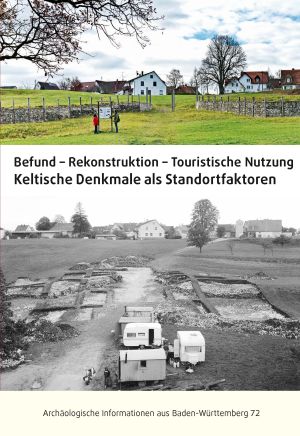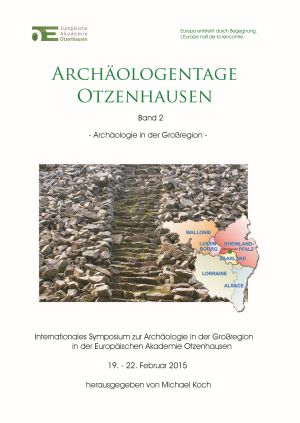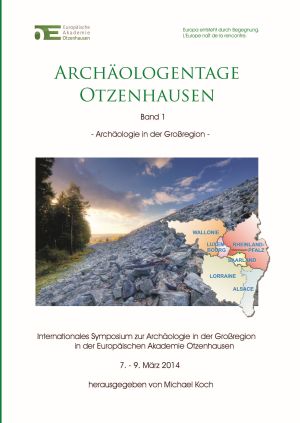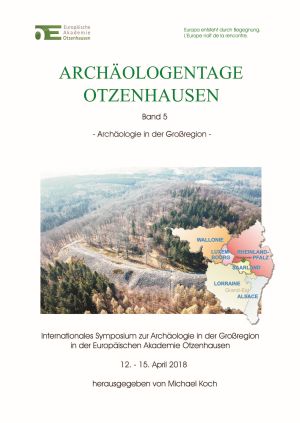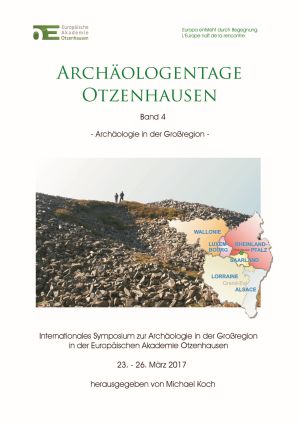Fritsch, Thomas
Befund – Rekonstruktion – Touristische Nutzung: Keltische Denkmale als Standortfaktoren
The “Heidengraben” on the Swabian Alb comprises the remains of a Late Celtic fortified settlement of the 2nd and 1st centuries BC. Archaeological finds and remains of ramparts visible above ground illustrate the supra-regional importance and the spatial dimensions of the Celtic oppidum, which is one of the largest in Central Europe.
On the occasion of new plans for the touristic enhancement of the large scale monument “Heidengraben”, an international colloquium was held in Grabenstetten in autumn 2013. The results of this conference are presented in this volume. The contributions deal with central questions of the reconstruction of archaeological features. However, the range of topics is not limited to specialised archaeological problems, but also deals with core aspects of a tourism concept. In this context, numerous experts from various scientific institutions and museums present “best practice” projects from Germany and Austria.
Archäologie in der Großregion: Beiträge des internationalen Symposiums zur Archäologie in der Großregion in der Europäischen Akademie Otzenhausen vom 19. - 22. Februar 2015
The present conference proceedings document the lectures and presentations of the 2nd Otzenhausen Archaeology Days and thus make them accessible to those who were not able to attend the Archaeology Days. It is not possible to document the countless conversations and "border crossings" that took place on the sidelines and during the breaks, in the evenings and during the excursions. And yet it is precisely these that make the Otzenhausen Archaeology Days so appealing.
Archäologie in der Großregion: Beiträge des internationalen Symposiums zur Archäologie in der Großregion in der Europäischen Akademie Otzenhausen vom 7. - 9. März 2014
At the conference „Archäologentage Otzenhausen 2014“ the University of Fine Arts in Saarland (HBKsaar) presented two new concept studies in the fi eld of „Digital Cultural Heritage“:
Even before its offi cial launch (2015), this system developed in the fi eld of digital cultural heritage could be tested through a preliminary study. During the „Otzenhausen Archaeology Days”, 2014, an experimental set-up provided the opportunity to learn more about the system and to gather hands-on experience.
Archäologie in der Großregion: Beiträge des internationalen Symposiums zur Archäologie in der Großregion in der Europäischen Akademie Otzenhausen vom 12. - 15. April 2018
This volume refers to the conference in 2018, where, for current reasons, the topic of "migration" took center stage. For archaeology certainly also has a political dimension, as already suggested by the winged phrase "future needs origin". The phenomena of migration, flight and displacement, as well as the passing on of craft techniques and cultural phenomena through migratory movements are as old as mankind itself. Especially for the greater region with the states of Rhineland-Palatinate, Saarland, Luxembourg, Lorraine, Alsace and Wallonia, this is an important topic.
this is a significant topic.
Archäologie in der Großregion: Beiträge des internationalen Symposiums zur Archäologie in der Großregion in der Europäischen Akademie Otzenhausen vom 23. - 26. März 2017
The Greater Region is traditionally an area with a focus on Celtic and Roman research. On the one hand, certainly, because there is a corresponding archaeological substance here, on the other hand but also because several associations interested in archaeology were already active here in the early 19th century and thus laid the foundation for today's interest in this era. Their work and excavation results shaped to a great extent over a long period of time the image of the "Celts" and "Romans" as it is commonly used. The present volume is now dedicated to one of these important Celtic researchers of the Greater Region for his 80th birthday: Prof. Dr. Alfred Haffner.



